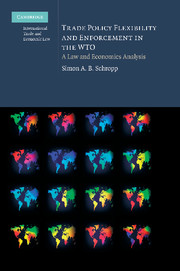Book contents
- Frontmatter
- Contents
- List of figures
- List of abbreviations
- Acknowledgements
- Foreword
- 1 Introduction: trade policy flexibility in the WTO – vice or virtue?
- PART I An introduction to incomplete contracting
- PART II Theorizing about the WTO as an incomplete contract
- PART III Flexibility and enforcement in the WTO: towards an agenda for reform
- Bibliography
- Index
PART II - Theorizing about the WTO as an incomplete contract
Published online by Cambridge University Press: 05 May 2010
- Frontmatter
- Contents
- List of figures
- List of abbreviations
- Acknowledgements
- Foreword
- 1 Introduction: trade policy flexibility in the WTO – vice or virtue?
- PART I An introduction to incomplete contracting
- PART II Theorizing about the WTO as an incomplete contract
- PART III Flexibility and enforcement in the WTO: towards an agenda for reform
- Bibliography
- Index
Summary
In Part I we studied the nature of incomplete contracts and way of overcoming them. Based on the insights gathered in Chapters 2 and 3, Part II will examine the World Trade Organization (as we could any multilateral trade agreement for that matter) from a contractual perspective. We will show that the WTO is best understood as a relational contract between self-interested policy-makers, characterized by complexity, longevity, repeated interaction, and by sizable incompleteness. The WTO has outgrown the narrow confines of the GATT 1947, and is now a bundle of Agreements covering a wide array of issue areas, including services, intellectual property, government procurement, and technical barriers to trade.
In order to comprehend and assess trade policy flexibility in the WTO, Chapter 4 will examine the nature of the WTO as an incomplete contract. We will moot the identity and preferences of WTO signatories, and will discuss their incentive(s) to conclude a multilateral trade agreement. This will be followed by a presentation of the basic entitlements – the nature of mutual commitments exchanged in the contract. We then proceed to investigate the intricacies of contractual interaction, and the contingencies (or shocks) that might occur during the performance phase of the WTO contract. This will allow us to sketch the types of incompleteness the trade agreement is beset with. Finally, we shall assess the scope for regret caused by the inevitable incompleteness of the contract.
Whereas Chapter 4 is concerned with basic entitlements (the primary rules of contracting).
- Type
- Chapter
- Information
- Trade Policy Flexibility and Enforcement in the WTOA Law and Economics Analysis, pp. 131 - 132Publisher: Cambridge University PressPrint publication year: 2009



